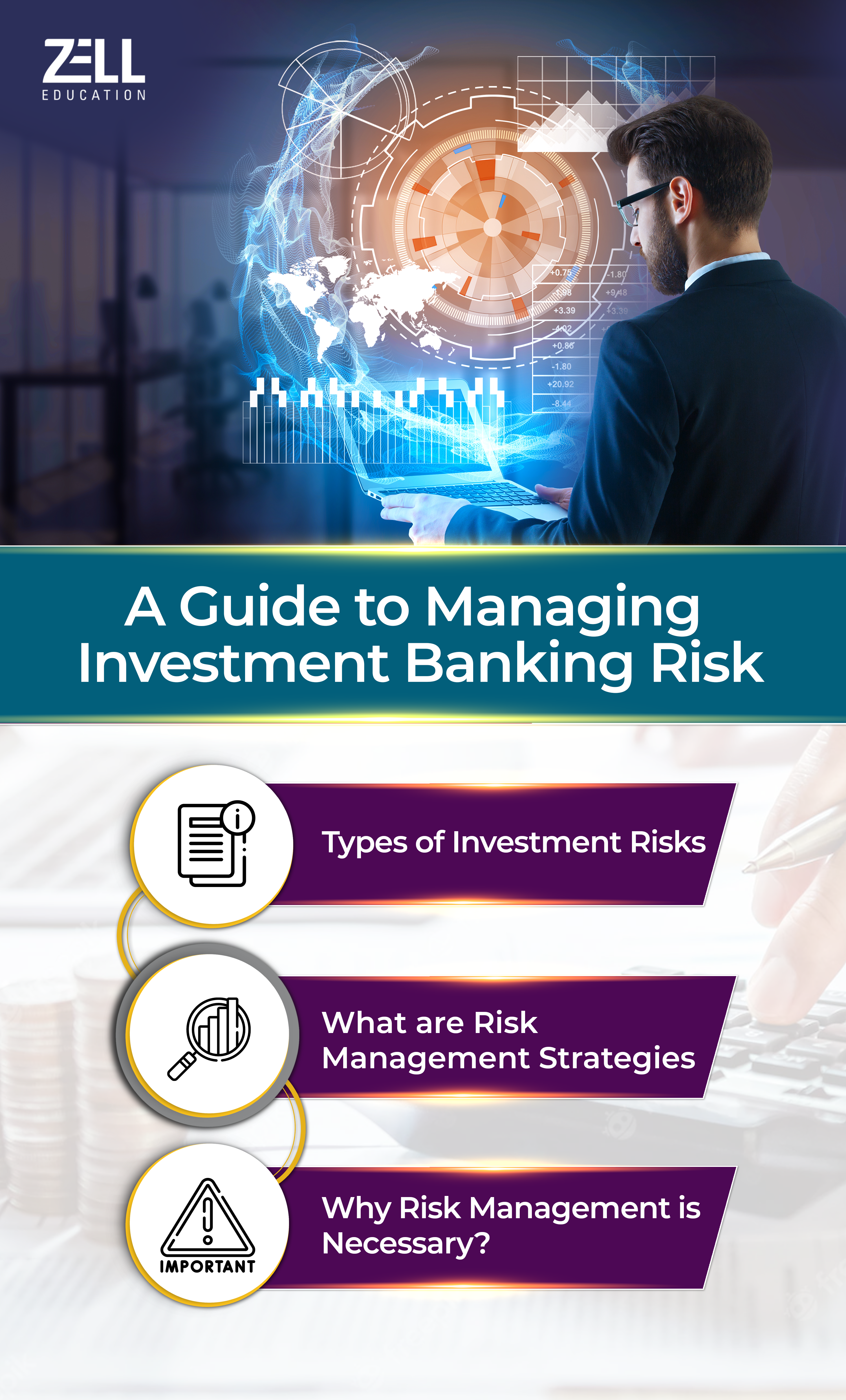Risk management is a highly sought-after skill in the investment banking industry. It’s a common saying that where there is money, there is danger. Therefore risk mitigation becomes a highly sought-after skill in the investment banking industry. This skill helps safeguard investment thereby ensuring sustainable profitability.

Types of Investment Risks
Investment banking includes many unique risks. Investment risks have their dynamism and individual ways of risk mitigation. Listing out certain prominent types of risks that an investment banker can encounter several times throughout his career
Market Risk
The market flows with its crests and troughs, therefore, market risks are systematic risks as fluctuations are an intrinsic part of the market. Any potential for loss that happens due to fluctuations in market prices, interest rates, exchange rates, and other macroeconomic factors is to be predicted by the market analyst.
Liquidity Risk
Liquidity refers to the speedy convenience with which an investment can be sold (liquified). A liquified risk arises when an investment cannot be easily sold or converted into cash without significantly affecting its price. This crisis affects the value of the investment. Illiquid investments can become blocks of liability during market downturns or when investors need to raise capital quickly.
Concentration Risk
An investment banker must prevent a portfolio from being saturated with a particular asset class, industry, or market segment, or else it will lead to Concentration Risk. Portfolio Diversification is usually adapted to mitigate it and the investments are spread across different industries.
Credit Risk
Bad credit simply ruins. Credit risk arises from the possibility of default by borrowers or counterparties. Investment bankers make and market analysts flag all the possible defaulters. Credit risk happens the most in debt securities, loans, and other credit-based investments.
Reinvestment Risk
Reinvestment risk occurs due to changes in market conditions or interest rates. When cash flows from investments have to be reinvested at lower rates of return, this risk arises, and a successful finance professional is trained to analyse the loss-making portfolio and reinvest in a sustainably profit-making manner.
Inflation Risk
Inflation risk happens out of inflation when the purchasing power of the people is at risk. The real value of investments in the economy declines over time due to inflation eroding their purchasing power. The investment bankers are required to safeguard the PPP (purchase power parity) concerning this risk.
Horizon Risk
Horizon risk can be predicted when the interest rates/market conditions are potent enough to impact the value of investments over different time horizons. Such a risk happens when there is a disparity between the investment horizon of an investor and the maturity or duration of the investment.
Lifespan Risk
Lifespan risk involves structured products which have limited lifespans. These investments are subject to fluctuation because of decay or market downsurge.
Foreign Investment Risk
Foreign investment risk encompasses political, economic, and regulatory uncertainties associated with investing in foreign markets. Therefore finance personnel should keep the following risk factors in mind — Currency fluctuations, geopolitical events, and sovereign risk.
What are Risk Management Strategies
Strategies are highly essential to identify, assess and mitigate potential financial portfolio threats. Following are some of the types of risk management strategies employed by the investment banking sector —
Comprehensive Risk Assessment
An assessment that comprehensively scans to identify and evaluate thoroughly every potential risk within investment portfolios. This assessment categorizes the risks found into three categories — high, medium or low risk.
Diversification
Never put all your eggs in one basket. Diversifying a portfolio is the best sustainable measure to take towards risk management. Investments are advised to be distributed across different asset classes, sectors, and geographic regions. It reduces concentration risk and minimizes the impact of adverse market movements.
Robust Internal Controls
When the administration implements stringent internal controls and governance frameworks, it ensures that all the regulatory needs are met. In this manner, a business can mitigate operational risks.
Stress Testing and Scenario Analysis
The investment bankers are trained to perform stress tests and scenario analysis to evaluate the resilience of investment portfolios under adverse market conditions. They identify potential vulnerabilities and try to mitigate them beforehand
Effective Risk Mitigation Techniques
There are mainly four risk mitigation techniques, namely — avoidance, reduction, transference, and acceptance. By utilizing hedging strategies like derivatives and insurance products one can protect against specific risks and limit the downside exposure.
Continuous Monitoring and Reporting
Potential risks can only be flagged when every operation is kept under robust monitoring. A reporting mechanism is likely to be set up to track portfolio performance, and emerging risks, and facilitate informed decision-making.
Why is Risk Management Necessary?
Yes, risk management is necessary to guard the investor capital, preserve wealth, and maintain the general public’s trust and confidence in the financial system. The promised resilience of the investment banking sector can be established by regular proactive identification and mitigation of risks. In such a manner, despite market fluctuations, investors can position themselves for long-term success.
Conclusion
Making investments sustainable and having a long-term ROI is the key role of investment banking. Thus it is essential to understand various types of risks and implement relevant risk management strategies on time to safeguard the economy.
FAQ’s on Managing Investment Banking Risk
What are the top 3 bank risks?
The top three bank risks are — credit risk, market risk, and operational risk.
What is the risk model for investment banking?
The risk model for investment banking is quantitative. They include scenario analysis, stress testing, and qualitative risk assessments. These models and screenings tend to identify, measure, and manage various types of economic risks.
What is high risk in banking?
High-risk activities happen in banking when there are volatile markets involved. Complex financial instruments are taken into consideration to deal with counterparties’ weak credit profiles.
What is risk-taking in IB?
Risk-taking in investment banking is making strategic decisions that involve several crucial things —
- Allocation of capital
- Pursuing critical opportunities
- Making financial returns sustainable
- Balancing rewards with risks.
